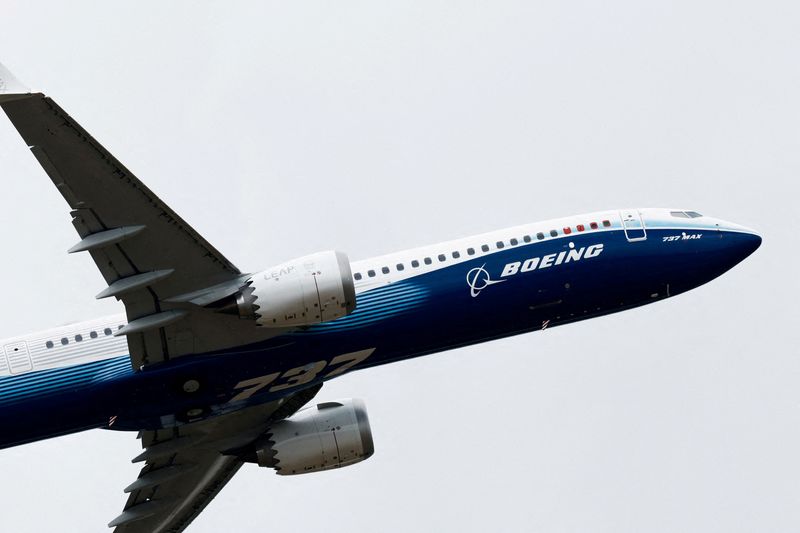By Medha Singh and Abhijith Ganapavaram
(Reuters) -Boeing's shares rose 3.7% on Monday after the planemaker and its biggest union reached a tentative deal covering more than 32,000 workers, averting a possible strike.
This was the first major negotiation by new CEO Kelly Ortberg, who took the helm just a month ago and has been tasked with turning around the struggling planemaker.
The proposed four-year contract was hailed by the union as the best it had ever negotiated and was cheered by investors.
However, it is far from a done deal.
Workers, who make the company's best-selling 737 commercial jet and other planes, will vote on Sept. 12 and can strike as early as Sept. 13 if they reject the contract and support a work stoppage.
The tentative deal with the union is a boost for Boeing (NYSE:BA) as it tries to restore investor and customer faith, navigate regulatory scrutiny and ramp up production of its 737 MAX after a door plug on a near-new MAX blew off a jetliner while in mid-air in early January.
Since that incident, Boeing's stock price has cratered 37%, compared to a 7.7% rise in the blue-chip Dow index.
As part of the tentative agreement, Boeing has committed to building a replacement for its workhorse 737 at its U.S. Pacific Northwest facilities, if the project is started during the four-year period of the labor contract, though the planemaker has not yet announced the new jet.
Boeing and rival Airbus are in the early stages of drawing up strategies for replacements of their best-selling single-aisle models that are expected to enter service in late 2030s.
The contract terms include a general wage increase of 25% over four years, below the 40% wage hike demanded by the International Association of Machinists and Aerospace Workers (IAM) union, signaling its recognition of Boeing's difficult financial position.
The wage hikes are tiered with the new and senior workers getting the largest share to boost retention, TD Cowen analyst Cai von Rumohr said in a note.
Jefferies analyst Sheila Kahyaoglu estimated a roughly $900 million hit to cash from the proposed wage increases.
NOT A DONE DEAL
J.P.Morgan analyst Seth Seifman said workers could still vote down the deal. There will be two votes on Thursday - one on the contract, which requires 50% to pass, and the second on whether to strike, which requires two-thirds approval.
"Workers have leverage and a highly unscientific sample of views on social media suggests dissatisfaction with the contract terms among some union members," Seifman added.
A strike authorization vote in July had secured 99.9% approval by workers.
Last year, Boeing's 737 fuselage supplier Spirit AeroSystems (NYSE:SPR) had to temporarily suspend factory production after workers rejected a four-year deal.

"While unlikely, if IAM strikes, we think it's realistic to assume the strike's duration would be in line with the 51 days of the last four walkouts," TD Cowen's von Rumohr added.
He pegged the hit to cash flow from a 50-day strike between $3 billion and $3.5 billion, at a time Boeing is already burning cash due to cost overruns in its defense business and lower 737 MAX production.